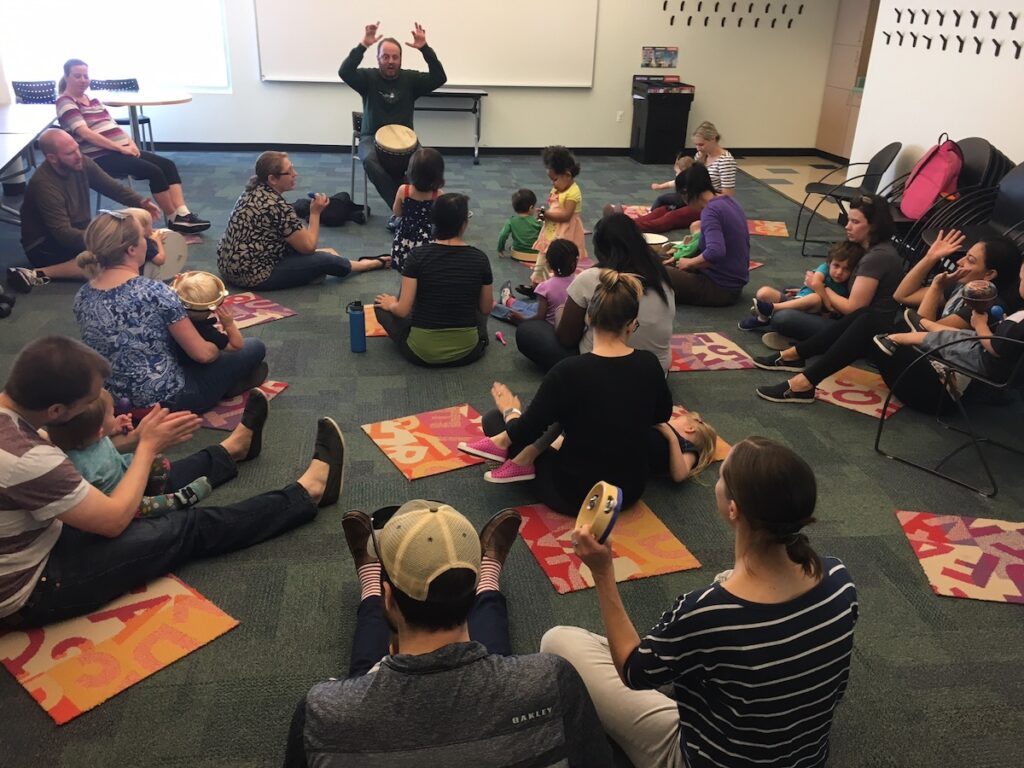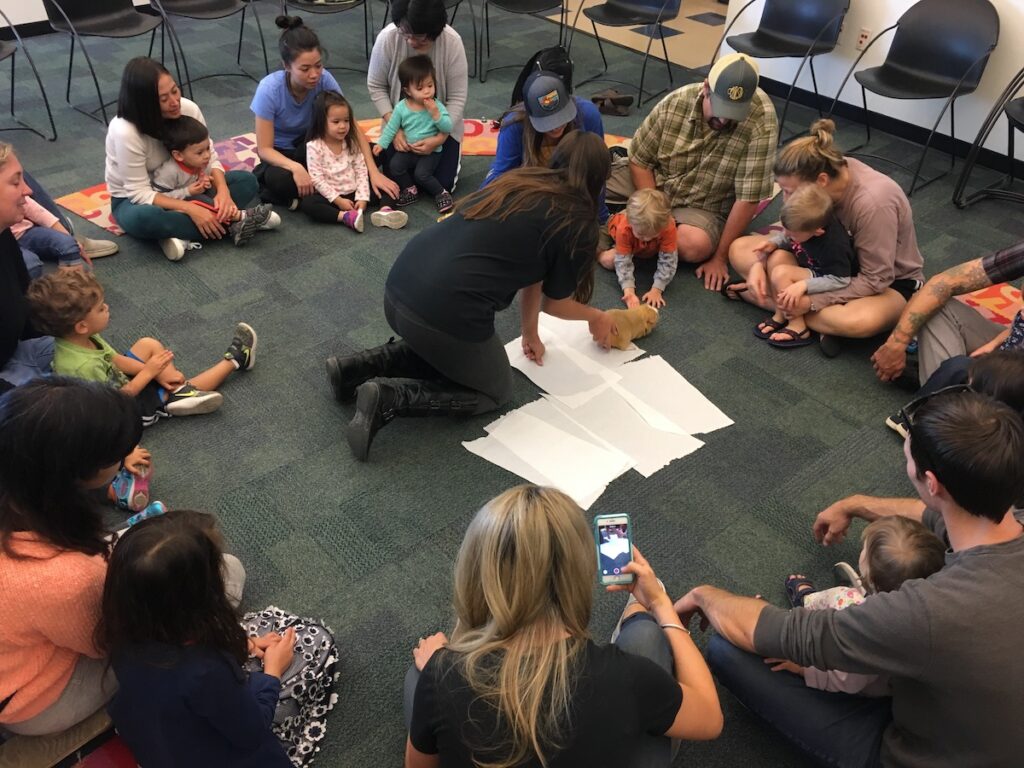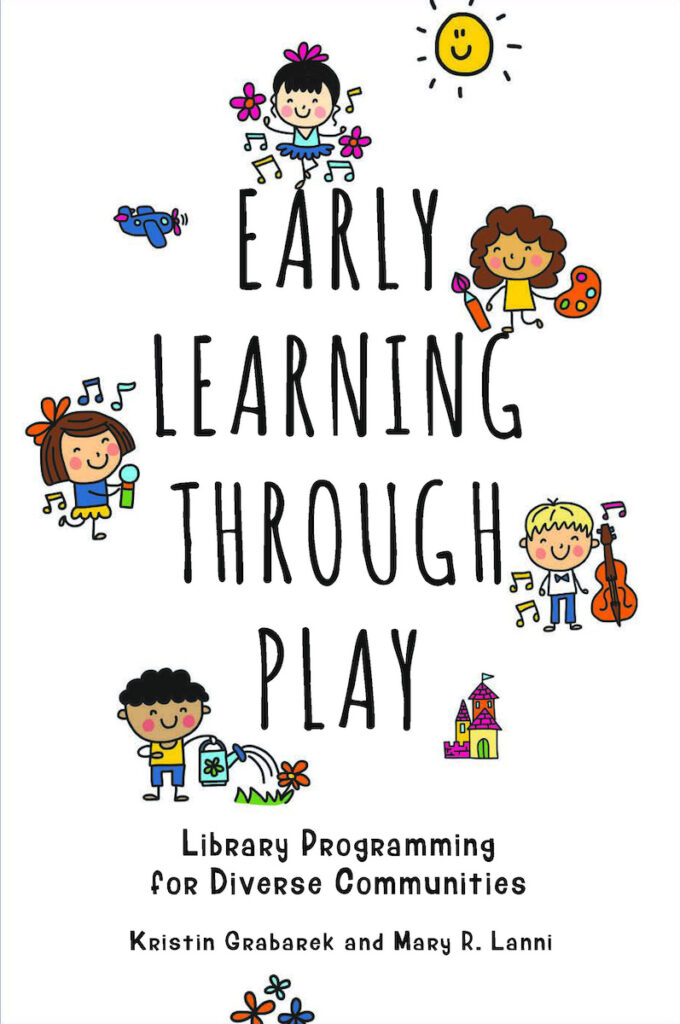For this blog post, I wanted to write about an awesome program, Little University, that is being rolled out at my branch (Rodolfo “Corky” Gonzales) and at several others in DPL. I am having so much fun with the program and am enjoying relating to our families in new ways. I can’t take credit for the idea, but Kristin Grabarek, the program’s originator, was kind enough to share her wisdom with both me and you in this email interview.
Interview with Kristin Grabarek, Librarian
Denver Public Library

What is Little University? When did it start?
Okay, Little University is a play-based early learning program offered every week at my library branch, on Saturday mornings. We are finishing up our fourth year and looking forward to starting our fifth!
We do all sorts of crazy stuff with children ages birth through preschool and their grown ups. We regularly bring in live animals and learn about their characteristics and habitats. We do yoga and mindfulness exercises, getting into complex balancing poses and always remembering to close with namaste. We do a little bit of artwork, prioritizing process over product, though usually the product looks pretty awesome. We have explored herbs, plants, and essential oils. We play ukuleles, with the kids using them as a drum and as a strumming exercise, and the grown ups learning four chords. We explore other languages, like French and Amharic, and other cultures. We dance like animals and like ballerinas. We play soccer indoors. We assemble and eat healthy snacks.
What does Little University offer that traditional storytime doesn’t?
This is a really good question. My vision for Little U never included it eclipsing a traditional storytime. It shouldn’t. Traditional storytimes are incredibly valuable to our communities as they encourage reading, and the love of reading, by promoting the ECRR practices of READ and SING, primarily.
My branch still offers three storytimes every week, in addition to Little University.
That said, reading and singing both require a shared language, to be successful for a group. Many families who love our library do not speak the same language as each other, or as the staff members. (We have many immigrant and refugee families from Africa and the Middle East in our community.)
Furthermore, a traditional storytime appeals to many families, but not all families. Some families are unable to attend a storytime on a weekday, some families are uncomfortable singing aloud in groups, some families struggle to keep their children focused during a storytime, some families feel a storytime is redundant to the efforts they already make at home.
Little University, then, is designed to flip the ECRR practices around to place PLAY at the center, followed by talking, in any language, then writing, then singing, and lastly, reading. The intention in doing so, is to provide an early learning program specifically for the aforementioned families, as well as those families who do love a good storytime, and want more early learning opportunities too!
How did you identify a need in your community for this kind of programming?
You know, I did an asset mapping project a few years ago, with our library system. I really believe this is an incredibly effective way for libraries to develop programs and services, and I try to keep this model in mind any time I put together a new project. Look into that model if you aren’t already familiar with it.
In addition to that, I also used a common sense approach to developing this programming. I talked with my families, shared my ideas and took their responses into consideration. I observed families in my own storytime session who I thought might appreciate a play-based program option. Then I gave it a try, with a plan to assess and evaluate after a year.
Professional presenters cost money. How did you secure funding for Little University?
That’s right, they do! I believe bringing in the experts is a key part of this program, and therefore prioritize securing funding for it.
During the first year, I ran the program through a combination of DIY programs that I led myself– which, incidentally, was tremendously helpful for relationship-building with my families!– and existing programming funds already set aside in our system for summer months.
It is possible, therefore, to do a Little University with little or no budget. Feel free to contact me for more information on this point.
That said, I found this to be too limiting. I wanted to notably broaden the horizons of my participants’ learning experiences, and working without a budget was keeping me constrained to Pinterest projects and storytime yoga.
So, I sought out grant funding from our neighborhood association. This filled my funding gap and allowed me to hire folks from wildlife rescue centers, the Colorado Ballet, an indoor soccer program, local businesses, and actual yoga instructors. Our program attendance exploded at this point, at the beginning of year two, and has been steadily at about twenty families every week, ever since.
How did you find presenters who were willing to work with a mixed age group of small children?
Ha! I asked! I’ve worked with programs in our library system for over ten years now, so I had a boatload of contacts to choose from. I simply reached out with my idea and asked if they would like to be a part of it.
Everyone responded enthusiastically, believe it or not.
What advice would you give to a storytime provider who is interested in getting started with play-based learning?
First, I’d advise them to do it! 😉 It’s fun!
Second, relationships are key here. Between you and your program attendees, between you and your program presenters, between program attendees and each other.
Consider, for a moment, your comfort level attending a program put on by someone you know, versus by someone you do not know. Let’s say, in the program, you have to step out to take an important phone call, or use the restroom, or feel ill and need to leave abruptly. If you are acquainted with the presenter, there is a comfort level there: you feel the presenter will understand, since they know you, that the phone call must have been important, that you truly needed a restroom break, that leaving early was unavoidable.
If you do not feel acquainted with the presenter, you experience concern, or even guilt, over these very understandable circumstances. You feel as though you may have been offensive, or done something wrong.
For this reason, relationships are critical to your play-based learning programs. The likelihood of a child acting out, needing a break, or appearing uninterested is exceptionally high. Grown ups who feel that they have messed up, are unlikely to return, and are unlikely to view their experience as a positive one.
More importantly, though, relationships allow us to learn from each other. These play-based experiences provide you valuable opportunities to share your expertise about gross and fine motor skills, kindergarten readiness, and school success. Grown ups, and their children, will receive this information openly, if they feel they have a trusting relationship with you.

Third, room set up matters so, so much. Whatever your program plan is, be intentional about how you set up your space. My recommendation is to go for a circle whenever possible, with grown-ups sitting on the floor right with their children. Feel free to email me for more specifics on ideal room set-ups for certain program topics.
Fourth, and lastly for now, go ahead and set a reasonable measure of success. This could be: all the families stay for the entire length of the program. This could be: each child engages with one segment of the program. This could be: every family takes a schedule of the next month’s events when they leave. I always welcome my families the same way, every week, no matter how well I know them, no matter how many times they have attended my program series. I tell them that I am a parent too, that everyone here is a parent or a caregiver. That we all know children at this age have a mind of their own, and strong opinions to boot. I say that the learning is happening whether it looks like it is, or not. I remind them that we are there to have fun, and more importantly to show our children that learning is fun.
One of the best ways to do this, I believe, is to play.

Please feel free to contact Kristin Grabarek at KGrabarek@DenverLibrary.org for more! Kristin has now expanded Little University to include a monthly program entitled Little University for Grown Ups, and is happy to share that experience as well. She would also love to hear about your own play based learning programs at your library locations!
Kristin has also written a book on this topic, scheduled to be published in March 2019. Find out more here: https://www.abc-clio.com/LibrariesUnlimited/product.aspx?pc=A5846P
